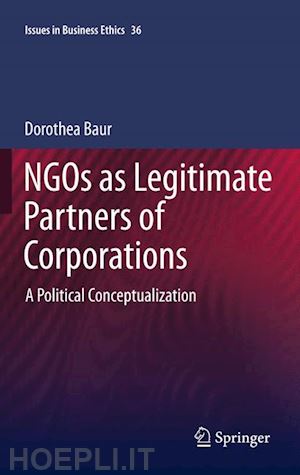
Questo prodotto usufruisce delle SPEDIZIONI GRATIS
selezionando l'opzione Corriere Veloce in fase di ordine.
Pagabile anche con Carta della cultura giovani e del merito, 18App Bonus Cultura e Carta del Docente
Introduction.- The problem.- How do corporations choose their partner NGO?.- Outline and methodology.- Part I Getting to the core.- 1. NGOs as representatives of public claims.- Part II Actors: Civil society and NGOs in the postnational constellation.- 2. The postnational constellation: A broad conception of democracy.- 3. Normative orientation from political theory.- 4. Civil Society: Coming to grips with an elusive term.- 5. Insights from Part II.- Part III Institutions and processes: A normative framework for legitimate partner NGOs.- 6. The public sphere.- 7.Public reason.- 8. The political process.- 9. Legitimacy.- 10. Insights from Part III.- Part IV Drawing a typology for legitimate partner NGOs.- 11. NGOs, interest groups and activists.- 12. Substantive characteristics of legitimate partner NGOs.- 13. Structural characteristics of legitimate partner NGOs.- 14. Procedural characteristics of legitimate partner NGOs.- 15. Insights from Part IV.- 16. Concluding remarks: Normative guidelines for conceptualizing NGOs as legitimate partners of corporations and future implications.- Political-theoretical guidelines.- Rights and duties of legitimate partner NGOs.- Future implications.- Bibliography.- Index.











Il sito utilizza cookie ed altri strumenti di tracciamento che raccolgono informazioni dal dispositivo dell’utente. Oltre ai cookie tecnici ed analitici aggregati, strettamente necessari per il funzionamento di questo sito web, previo consenso dell’utente possono essere installati cookie di profilazione e marketing e cookie dei social media. Cliccando su “Accetto tutti i cookie” saranno attivate tutte le categorie di cookie. Per accettare solo deterninate categorie di cookie, cliccare invece su “Impostazioni cookie”. Chiudendo il banner o continuando a navigare saranno installati solo cookie tecnici. Per maggiori dettagli, consultare la Cookie Policy.